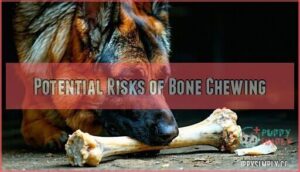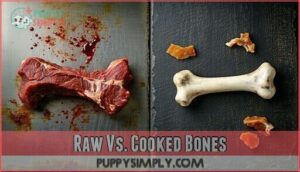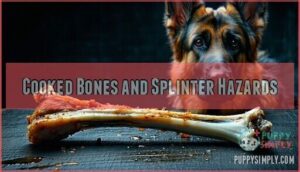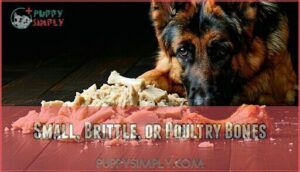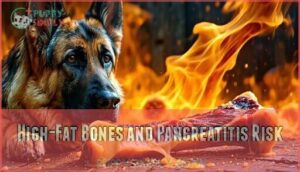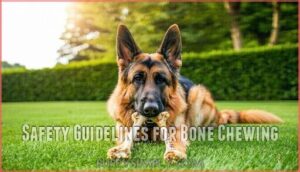This site is supported by our readers. We may earn a commission, at no cost to you, if you purchase through links.

Choose large, sturdy raw bones longer than your dog’s muzzle to prevent choking. Always supervise chewing sessions and limit them to 10-15 minutes. While bones offer real benefits, they also carry risks like intestinal blockages and bacterial contamination. Smart bone selection and proper safety measures make all the difference between a healthy treat and a vet emergency.
Table Of Contents
- Key Takeaways
- Can German Shepherds Chew on Bones?
- Benefits of Bones for German Shepherds
- Potential Risks of Bone Chewing
- Safe Bone Types for German Shepherds
- Bones to Avoid for German Shepherds
- Alternatives to Traditional Dog Bones
- Safety Guidelines for Bone Chewing
- Frequently Asked Questions (FAQs)
- Conclusion
Key Takeaways
- Only give your German Shepherd raw bones – cooked bones splinter dangerously and can cause life-threatening internal injuries, while raw bones stay flexible and digestible.
- Choose large, sturdy bones longer than your dog’s muzzle – this prevents choking hazards and matches your German Shepherd’s powerful chewing strength.
- Always supervise and limit chewing sessions to 10-15 minutes – remove bones after this timeframe to prevent overconsumption and reduce risks of blockages or bacterial contamination.
- Watch for emergency warning signs like excessive bleeding, breathing difficulty, or persistent vomiting – these symptoms require immediate veterinary attention and shouldn’t be ignored.
Can German Shepherds Chew on Bones?
Yes, German Shepherds can chew on bones, but it’s not a simple yes-or-no answer. These powerful dogs have strong jaws and natural chewing instincts that make bone safety especially important. Your German Shepherd’s aggressive chewing style means you’ll need to be extra careful about bone selection and supervision.
Puppies require different considerations than adult dogs in terms of bone digestion and safety. Their developing teeth and smaller size create unique risks. Some dogs may have bone allergies, though this is relatively rare.
Breed specifics matter here – German Shepherds are notorious for their intense chewing habits. They can demolish inappropriate bones quickly, creating choking hazards or intestinal blockages. To mitigate risks, consider limiting chewing time. The key isn’t whether they can chew bones, but whether you’re choosing the right ones and following proper safety protocols to minimize potential risks.
Benefits of Bones for German Shepherds
When you’re considering bones for your German Shepherd, you’ll find they offer several compelling benefits that go beyond simple entertainment. These natural chews can support your dog’s dental health, provide mental enrichment, and deliver valuable nutrients that contribute to their overall well-being.
Dental Health and Plaque Reduction
Your German Shepherd’s chewing action naturally triggers saliva production, which acts like nature’s toothbrush. This process helps break down plaque before it hardens into stubborn tartar. The mechanical scraping against teeth surfaces provides natural tartar control, while gum stimulation promotes healthy circulation and can lead to breath improvement.
Key dental benefits include:
- Natural plaque removal through mechanical scraping action
- Increased saliva flow that neutralizes harmful bacteria
- Gum massage that strengthens tissue and reduces inflammation
- Fresher breath from reduced bacterial buildup in the mouth
However, choose bones carefully to avoid dental damage to your German Shepherd’s teeth.
Mental Stimulation and Enrichment
Boredom transforms your German Shepherd into a destructive force, but bone chewing redirects those natural chewing instincts productively. This mental stimulation engages problem-solving skills as they work to access marrow and meat.
Unlike puzzle toys or training games, bones provide extended focus time, satisfying your dog’s need for meaningful activity while preventing destructive behaviors around your home.
Nutritional Value and Minerals
Raw bones offer valuable nutrition for your German Shepherd, packed with essential minerals like calcium and phosphorus. Bone composition provides natural mineral absorption that promotes strong teeth and bones.
Raw bones deliver calcium and phosphorus straight to your German Shepherd’s system—nature’s own supplement for stronger teeth and bones
The nutrient density in raw meat bones includes beneficial bone marrow, which acts as a supplement source for healthy fats and proteins.
However, your dog’s regular diet should remain their primary nutrition source, with bones serving as occasional treats rather than meal replacements.
Potential Risks of Bone Chewing
While bones offer many benefits for German Shepherds, they can also pose serious health risks that every owner should understand. From choking hazards to potential infections, these dangers require careful consideration before you hand your dog that tempting bone.
Choking and Intestinal Blockages
Despite being with larger dogs, German Shepherds face significant choking hazards when bones break apart. Emergency intervention becomes critical when bone fragment size creates digestive blockages. Your dog’s tendency toward swallowing whole pieces increases surgical removal risks considerably. Raw bones offer benefits like dental health.
- Blockage symptoms include persistent vomiting, lethargy, and loss of appetite
- Fast eaters face twice the choking risk compared to careful chewers
- Prompt intervention within four minutes dramatically improves survival outcomes
Tooth Damage and Oral Injuries
Hard bones can crack your German Shepherd’s teeth like hammers on porcelain. Fractured teeth create painful dental infections, while sharp bone fragments cause gum lacerations and palate injuries. Even appropriately sized bones can lodge foreign objects between teeth, compromising your dog’s oral health.
Monitor chewing sessions closely—dental emergencies require immediate veterinary attention to preserve your German Shepherd’s long-term dental health.
Bacterial Contamination and Illness
Chewing contaminated bones exposes your German Shepherd to serious bacterial infections that can affect both your dog and your family. Raw bones frequently harbor dangerous pathogens, creating potential health hazards that many owners don’t consider. However, some owners believe raw bones provide natural dental care.
Watch for these contamination symptoms in your German Shepherd:
- Digestive issues – vomiting, diarrhea, or loss of appetite
- Lethargy – unusual tiredness or weakness after bone consumption
- Fever – elevated body temperature indicating bacterial infection
- Dehydration – excessive panting or dry gums from illness
Salmonella risk and E. coli exposure from raw bones can cause severe digestive issues in German Shepherds. Proper bone handling and safe sourcing help minimize dog health hazards, but contamination remains a real concern even with careful preparation.
Safe Bone Types for German Shepherds
Choosing the right bones for your German Shepherd isn’t as simple as grabbing any old bone from the butcher shop. Understanding which types are safe and which can turn into expensive vet visits will help you make the best choice for your furry companion.
Raw Vs. Cooked Bones
When choosing between raw bones and cooked bones for your German Shepherd, cooking alters structure dramatically. Cooked bones become brittle and splinter easily, creating serious safety risks. Raw bones stay flexible and digestible, though bacterial risk comparison shows they can carry salmonella.
You can find various raw bone products for your dog. Safe preparation methods include proper sourcing and refrigeration for raw bones, while avoiding all cooked bones entirely.
Appropriate Bone Size and Shape
Size matters when it comes to German Shepherds chewing bones. Choose bones longer than your dog’s muzzle length to prevent swallowing hazards. German Shepherds need sturdy bones that match their powerful chewing style. Avoid small, dense bones that could crack teeth or cause blockages.
Consider your dog’s individual chewing habits and breed variation when selecting appropriate bone density and thickness for safe enjoyment. It’s also vital to think about appropriate bone sizes for your dog.
Veterinary Recommendations
Most veterinarians recommend raw bones over cooked ones due to lower splintering risks. The AVMA and AAHA caution against weight-bearing bones that can fracture teeth. Vet-approved bones should match your German Shepherd’s size, and supervise chewing sessions under 15 minutes. Some owners prefer to buy quality raw bones for their pets.
Many vets suggest bone alternatives like VOHC-approved dental chews for safer dental health maintenance.
Bones to Avoid for German Shepherds
While some bones can benefit your German Shepherd, certain types pose serious health risks that every owner should recognize. You’ll want to steer clear of cooked bones, small brittle options, and high-fat varieties that can lead to dangerous complications like splintering, choking, or pancreatitis.
Cooked Bones and Splinter Hazards
Never give your German Shepherd cooked bones. Heat changes bone structure, making them brittle and prone to splintering dangers. These sharp bone fragments can cause internal damage to your dog’s mouth, throat, and digestive tract. Cooking effects eliminate the bone’s natural flexibility, creating deadly choking hazards.
A healthy diet should include safe vegetable sources for essential nutrients. Watch for emergency signs like difficulty swallowing or blood.
Small, Brittle, or Poultry Bones
Small chicken bones can turn your German Shepherd’s meal into a veterinary emergency. These bone fragments create serious splintering hazards and digestibility issues that even large dogs can’t handle safely.
Three critical poultry concerns for German Shepherds:
- Chicken wing bones – hollow and brittle, they shatter into razor-sharp pieces
- Turkey neck bones – small enough to create choking risks despite seeming appropriate
- Fish bones – tiny fragments can puncture intestinal walls causing internal bleeding
Size matters in the context of bone dangers, and poultry bones fail every safety test for your loyal companion.
High-Fat Bones and Pancreatitis Risk
Fatty bones pose serious health risks for German Shepherds, potentially triggering pancreatitis—a painful, life-threatening condition. High Fat Content in marrow bones can overwhelm your dog’s digestive system, causing vomiting, diarrhea, and severe abdominal pain. German Shepherds show particular Breed Sensitivity to these potential risks, making Dietary Management essential.
Bones offer benefits such as stimulating saliva enzymes to prevent plaque. Skip fatty bones entirely and choose safer bone alternatives.
Alternatives to Traditional Dog Bones
If traditional bones aren’t right for your German Shepherd, you’ll find plenty of safe alternatives that satisfy their powerful chewing instincts. Commercial chew toys, rawhides, and specialized dental treats can provide the same benefits without the risks of splintering or bacterial contamination.
Durable Chew Toys and Simulated Bones
When German Shepherds need safe chewing options, durable synthetic alternatives satisfy their chewing instincts without traditional bone risks. Material Safety guarantees these toys won’t splinter, while proper Size Matters for your dog’s breed.
Consider these chewing options:
- Nylabones – Long Toy Lifespan, designed for powerful Chew Styles
- KONG Classic – Stuffable design keeps dogs engaged longer
- Benebone – Flavored nylon appeals to different preferences
Brand Comparison reveals quality differences in construction and durability.
Rawhide and Natural Chews
While rawhide digestion remains challenging for many German Shepherds, natural alternatives offer safer chewing solutions. Processing concerns around chemical treatments make ingredient safety essential when selecting chews.
Natural options like bully sticks, beef trachea, and tendons satisfy chewing instincts while supporting dental health. Consider chew sourcing carefully—single-ingredient products reduce digestive risks compared to processed rawhide alternatives.
Long-Lasting Dental Treats
Long-lasting dental treats pack a punch in terms of keeping your German Shepherd’s teeth clean and mind occupied. These specially formulated chews offer extended chewing duration while promoting dental health through natural scraping action.
Consider these top options for your furry friend:
- Benebone Wishbone – flavored nylon chews designed for powerful jaws
- Greenies Dental Chews – digestible treats with proven plaque-fighting ingredients
- Yak Chews – hard, long-lasting natural treats from yak milk
- Antlers – naturally shed deer antlers providing hours of safe chewing
Always check treat ingredients and verify breed suitability before offering new chew toys to your German Shepherd.
Safety Guidelines for Bone Chewing
Following proper safety guidelines prevents accidents and keeps your German Shepherd healthy during bone-chewing sessions. You’ll need to watch your dog closely, store bones correctly, and recognize warning signs that require immediate veterinary attention.
Supervision and Chewing Duration
Never leave your German Shepherd unsupervised while bone chewing – accidents happen faster than you’d think. Set a timer for 10-15 minutes maximum per chewing session, then remove the bone even if they’re still interested. This prevents overconsumption and reduces choking risks.
With multiple dogs, separate them during chew time to avoid resource guarding conflicts that could turn dangerous. Raw bones are safer, but cooked bones splinter easily and should be avoided.
Proper Storage and Disposal
Smart storage and disposal practices prevent bacterial growth and keep your German Shepherd safe from potential risks. Raw bones require careful handling to avoid contamination and health issues.
- Refrigerate immediately – Store unused bones within 15 minutes of giving them to your dog
- Follow the 3-4 day rule – Dispose of bones after this timeframe to prevent dangerous bacterial buildup
- Inspect before each use – Check for cracks, sharp edges, or signs of spoilage during bone inspection
- Use proper refrigeration guidelines – Keep bones at 40°F or below in sealed containers
- Practice safe handling – Wash hands thoroughly after touching raw bones to avoid cross-contamination
Signs of Veterinary Emergencies
Watch out for these red flags that spell trouble. Excessive bleeding, breathing difficulty, or sudden collapse demand immediate vet attention. Seizure activity, severe pain, or uncontrolled vomiting signal a potential veterinary emergency.
Abdominal pain paired with lethargy can indicate serious internal issues from bone fragments. Don’t wait—these potential risks require professional care immediately.
Frequently Asked Questions (FAQs)
What are some alternatives to real bones for German Shepherd puppies?
You’ve got great alternatives for your German Shepherd puppy! **Try commercially-made chew toys, simulated bones, or frozen Kong toys stuffed with treats.
These safer options satisfy their chewing needs without splintering risks**.
How often can German Shepherds have bones?
Ironically, while German Shepherds love bones, you shouldn’t give them daily treats. Offer bones 2-3 times weekly maximum, supervising closely and removing after 15 minutes to prevent overindulgence and digestive issues.
Can pregnant German Shepherds safely chew on bones?
Pregnant German Shepherds can safely chew bones with extra caution. Choose large, raw bones and supervise closely. Remove after 10-15 minutes to prevent overconsumption, which could affect their nutritional balance during pregnancy.
How long should German Shepherds chew bones daily?
Like a marathon runner needs pacing, your German Shepherd should chew bones for 10-15 minutes daily. Remove them after this time to prevent over-chewing and potential digestive issues.
Do German Shepherds need bones if eating kibble?
German Shepherds don’t need bones if they’re eating quality kibble. Kibble provides complete nutrition, but bones can offer dental benefits and mental stimulation. They’re optional treats, not nutritional requirements for healthy dogs.
Conclusion
Absolutely nothing compares to the peace of mind that comes from knowing whether German Shepherds can chew on bones safely. You’ve learned that raw bones offer real benefits when chosen correctly, but cooked bones are dangerous territory you’ll want to avoid completely.
Remember that supervision, proper sizing, and time limits turn bone chewing from risky business into healthy enrichment. When in doubt, consult your veterinarian about the best options for your furry companion’s specific needs.
- https://docs.google.com/forms/d/1GAQr3Kn1cURCVHUA82hAga1Wv8DCH0IuqDLRUrOpN7M/viewform?ts=63f4f653&entry.1515682415=https://www.merriam-webster.com/dictionary%2Fcan
- https://premium.britannica.com/mw-unabridged/?utm_source=mw&utm_medium=inline-def&utm_campaign=evergreen
- https://tr.thefreedictionary.com/kutu
- https://es.thefreedictionary.com/esforzar
- https://grammar.collinsdictionary.com/us/easy-learning/when-do-you-use-can-and-could-in-english


